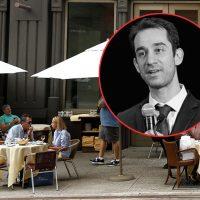As Covid-19 cases spike in certain New York City neighborhoods, fears of a second wave are growing — and the city is responding with restrictions on restaurants, schools and other nonessential businesses.
Mayor Bill de Blasio announced on Sunday that the city will move to close some schools, as well as nonessential businesses, in 20 hot spots in Brooklyn and Queens due to rising infection rates, the New York Times reported. The changes are subject to approval from Gov. Andrew Cuomo.
The new restrictions would close schools in nine of the city’s 146 zip codes, as well as nonessential businesses. Indoor and outdoor dining would also be off-limits, although restaurants would still be able to do take-out and delivery.
Nine zip codes would be subject to the most severe restrictions, and include portions of Far Rockaway and Kew Gardens in Queens, and Borough Park, Midwood, Gravesend, Bensonhurst and Sheepshead Bay in Brooklyn.
Read more

In another 11 ZIP codes, schools would remain open, but indoor dining, which began less than a week ago in the city, would be banned.
Those include parts of Williamsburg, Bedford-Stuyvesant, Fort Greene, Clinton Hill, Manhattan Beach, Bergen Beach, Kensington and Crown Heights in Brooklyn; and Rego Park, Fresh Meadows, Hillcrest and Jamaica Estate in Queens.
Imposing these restrictions is a major setback for the city, which has made a significant recovery from the height of the pandemic in the spring, when it was the worst hotspot in the country. Many businesses are now open — including bars and restaurants, as well as gyms and malls — and last week, the entire public school system reopened.
The new restrictions would last for two to four weeks if not longer, depending on the success of efforts to curb the virus, the mayor said.
Cuomo, whose testy relationship with de Blasio is well-documented, chided “local governments” over the weekend for not effectively enforcing social distancing guidelines and mask-wearing in hot spot zip codes, [NYT] — Akiko Matsuda
